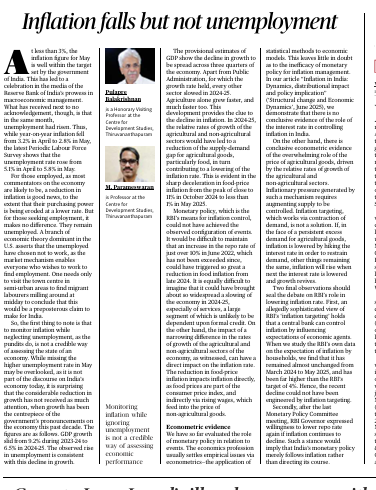1. Context: Recent Economic Indicators
- Inflation for May 2025 was below 5% — a positive signal celebrated by the government.
- However, unemployment remains high despite the falling inflation rate.
- As per CMIE data:
- Unemployment rose from 4% to 8.2% in May 2025.
- Urban unemployment rose from 7% to 9.2%.
- Labour participation rate (LPR) fell from 9% to 40.7%, suggesting fewer people looking for jobs.
- Unemployment rose from 4% to 8.2% in May 2025.
2. What This Suggests
- Falling inflation ≠ improved job market.
- Job creation is not picking up even though prices are stabilizing.
- Demand for labour may be shrinking, or people may be withdrawing from the job market due to frustration or lack of opportunities.
3. Structural and Policy Issues
- There’s a disconnect between macroeconomic stability (low inflation) and labour market outcomes (joblessness).
- Private sector, despite high profits, is not hiring proportionally, especially in high-employment-generating sectors.
- Emphasis on capital-intensive production rather than labour-intensive growth.
4. Measurement and Data Issues
- The provisional estimates of GDP do not always reflect employment trends.
- High GDP growth doesn’t necessarily translate into more jobs (jobless growth).
- Need for better labour market data and deeper analysis of sector-wise job creation.
5. Policy Recommendations
- Focus on employment-intensive sectors like textiles, construction, agro-processing, and MSMEs.
- Reform labour laws to encourage hiring and formalization.
- Monitor LPR, youth unemployment, and disguised unemployment more accurately.
- Shift away from GDP-fetishism towards people-centric development metrics.
6. Broader Implications
- Rising unemployment amidst falling inflation can lead to:
- Weak demand in the economy.
- Widening inequality.
- Political and social unrest if jobless growth persists.
- Weak demand in the economy.
🧾 UPSC-Style Questions (GS3 – Indian Economy)
🔹 10-Marker (150 Words)
- Falling inflation does not necessarily translate to job growth. Explain with reference to India’s current macroeconomic scenario.


